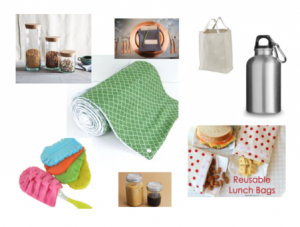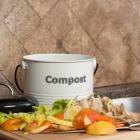Choosing your waste footprint
Submitted by Lara Isaacson on | Updated Wed, 25/10/2017 - 16:24

"Why would you deprive yourself?" This is an understandable question that I often read on the polite, half-hidden grimaces of those who suddenly realize that I am pursuing a zero waste lifestyle. Soon the looks of concern fade as I explain how much I love my lifestyle and the unexpected benefits. Yet, I can sometimes feel the distance between us grow as if they are placing me into the ‘radical’ box in their mind in order to avoid self-examination. Thankfully, that is not always how it goes. Often, my reassurance and enthusiasm draw people into a journey of self-discovery and empowerment. Do I feel deprived? Absolutely not! I feel privileged to have been able to pursue such a lifestyle.
Who can practice a zero waste lifestyle?:
I believe anyone in a developed nation--whether they live in rural Idaho, downtown Los Angeles, or in the suburbs of Austin, Texas--can begin the journey towards a zero waste lifestyle. It's all about reducing your own landfill footprint in order to have life-giving ripple effects on your community and planet. It starts with the individual.
Yet, money does matter, and privilege has many effects on our circumstances. The deeper reality we are often afraid to face, is that we can choose how we manage our privileges and assets while navigating the challenges presented by our contexts and our subjugated identities. We can all work within our limitations and work to break down accessibility barriers to sustainability for others.
The way I have been venturing towards a zero waste lifestyle, has involved checking out informational books from the local public library and reusing many items I already had or that others were tossing anyway. I do not have a lot of extra monetary resources, so I make do. I realize I am fortunate to have a library within walking distance and have connections with people that have an extra crockpot in their cupboard that they can give me. My hope is that by sharing a bit about my own experience navigating a limited paycheck, you can find creative ways around your waste reductions hurdles.
Starting the Journey:
As with many (but not all) others joining the zero waste movement, I have been seeking out ways to be green for as long as I can remember. My journey started with testing out natural stain removers for a science project when I was in elementary school. (This project was inspired by my mother who was trying to navigate keeping her children healthy in a world of circle-cut meats and neon gummies in plastic wrapped lunch kits). In middle school, I remember writing about the ills of High Fructose Corn Syrup for my English class, and in my small-town high school I advocated for the use of non-toxic, refillable whiteboard markers. Yet, when I discovered Bea Johnson's book, Zero Waste Home, I unlocked an infinite number of new levels for my sustainability game. With these new challenges, I began to really see how my actions mattered and could have a large positive impact.
Bea walks you through her house and path toward zero waste with her family. She provides ingredients for you to make your own zero waste lifestyle recipe. Since then, I have joined a robust community of people from many life stages and backgrounds (see some links below). These inspiring people have gracefully rebelled against the disposable-centric world, to do what the average citizen has never considered. They have planned zero waste weddings, reduced their landfill waste to a mason jar per year, traveled and camped across the world waste-free, and raised children without buying into the consumeristic childhood vortex. They seem to be nothing short of super human, and certainly, their trail-blazing is admirable. Yet, they will all tell you, this lifestyle is possible for anyone.
Zero Waste Home with Bea Johnson
Fort Negrita with Anamarie Shreeves
Trash is for Tossers with Lauren Singer
WasteLand Rebel with Shia
The Rogue Ginger with Erin Rhoads
Treading My Own Path with Lindsay Miles
Zero Waste Guy with Jonathan
No Impact Man with Colin Beavan
Many more (in many languages) on the Zero Waste Bloggers Network
Why on Earth?
How to be zero waste varies between different people. However, more important than the ‘how’ is the ‘why.’ Here are 3 of the major reasons why we pursue zero waste.
1. Landfills are not the future; compost is.
Landfills not only take up habitat, pollute groundwater, and release an extremely potent greenhouse gas (Methane) into the atmosphere, they also create a nasty environmental justice issue by disproportionately polluting low income areas. Additionally, about 2/3 of household waste is compostable, and compost is going to be one of the biggest solutions to climate change. Applying compost greatly helps the soil take and store carbon dioxide. The more soil that can store carbon dioxide, the less carbon in the air to worsen the effects of Climate Change. As an added bonus, consuming less, lowers your carbon footprint by using less energy to transport, make, and dispose of packaging.
2. The Plastic vortex doesn't just hurt turtles and birds.
Many of us have seen the tragic images of animals suffering because of our plastic waste, and this certainly motivates a good many of us to pause when looking to by sodas held together by plastic rings or accept a plastic bag when we go out to eat. However, for others these creatures are far removed from our daily lives and we are each just one in 7 billion people, right? Well yes this is true, but ripple effects work both ways. About 8 million tons or 1 garbage truck every minute worth of plastic leaks out of our waste system (mostly unintentionally) and floats into our oceans. By 2050 there will be more plastic than fish by weight in the oceans. Even if you don't go to the ocean, that plastic may be in your local waterways. Even if that doesn't bother you, if you ever eat fish, it may contain plastic particles that they ingested before making it to your plate. I could go on about how we are all connected to the oceans and the life in them, but I think you get the picture. Plastic photodegrades under the suns heat in the ocean and becomes micro plastic. This plastic swirls about in a large vortex of confetti. There is a common misnomer for this: The Great Pacific Garbage Patch. There are similar "patches" actually many throughout the globe, but they are NOT visible from a satellite. Sorry you cannot see it on Google Earth. Scoping up the water in the area where the ocean currents converge is how you see it. See the documentary Garbage Island to discover for yourself.
3. Clean up is not efficient enough
People's logical first response is (the same as my own), "If we know it's there, why don't we go clean it up?!" The short answer, we are on small scales and it's too big and small to clean up. We have to stop the flow into the ocean instead. That brings us back to us. All we have is us and our impact, and individually we do have a large impact. If owe can choose a lower impact, others will see they can as well. No amount of proselytizing can replace positive actions in our own lives.
Unexpected Perks:
To be fair, I don't think I have properly answered the question about deprivation from the first paragraph. So here are some of the unexpected benefits that make me feel privledged, not deprived, with a zero waste lifestyle.
- I feel healthy with minimal effort, now that I avoid much of the packaged, processed foods in the grocery stores. The bulk bins have chocolate peanut butter buttons. (Yes, they are incredible!) Yet, most of what can be found in bulk bins have zero added ingredients. Bulk bins often have basic staples or mixes with simply combined ingredients for quick soup for those lazy nights.
- I also now have my food all easily visible on my shelves, displayed in glass mason jars. This makes my shopping list more useful, as I can always see what I have when I write it.
- I only have to empty my garbage jar (yes, its a jar, not a can or bin) about once a month or less. A chore I used to detest is much more bearable with less frequency.
- I don't have to buy expensive disposable plastic snack and trash bags.
- I don't have to worry about wrappers flying away when I'm on a hike or worry about finding a trash bin ( I almost never need one!).
- I waste less food waste too because I can buy just what I need, not whatever large or odd amount the company decided to sell me.
- I find solace in knowing that I am choosing my own waste footprint whenever possible. Participating in the 2.89 lbs in the U.S. (2.13 kg per capita in Canada) of landfill trash per person, per day does not sit well with me, and I hope this post can help others who feel the same way.
I challenge you today to think of one thing you can do better moving forward, in a way that makes a sustainable lifestyle beautiful and comfortable for you. Once you master that, find a new thing to shift. Before you know it, you'll have virtually no landfill waste!
If you have questions, no matter how small they may seem, please post them in the comments.
Here's to working on our one thing in the coming days and choosing our impact!
You will save the Earth by sharing and/or tweeting (corny right?)





